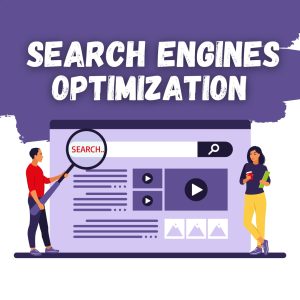What is SEO?
If you operate a business online, you have likely come across the term SEO. What is SEO, and why is it crucial for your business? We will discuss search engine optimization and why it should be essential to your marketing strategy.
What is SEO?
SEO stands for Search Engine Optimization. It is optimizing your website and its content to improve its visibility and ranking in search engine results pages (SERPs).

The Importance of SEO for Your Business
In today’s digital age, many individuals rely on search engines like Google to discover information, products, and services online. If your website fails to appear prominently on search engine results pages, it could be difficult for potential customers to locate your business online.
SEO helps you improve the user experience of your website. Search engines can also enhance their usability and accessibility for your visitors. This means your website will be easier to navigate, and visitors can find the information they seek more easily.
SEO is a cost-effective marketing strategy to help you reach your target audience and increase brand awareness. Unlike traditional advertising methods, such as TV or print ads, SEO allows you to target specific keywords and phrases your potential customers search for online.
How SEO Works
Search engine optimization works by optimizing your website and its content for search engines. Optimizing your website and its content for these algorithms can improve your website’s visibility and rank in search engine results from pages.
Search engines use several factors to determine your website’s ranking in search engine results pages. These factors include:
- Keyword relevance and density
- Website structure and architecture
- Quality and relevance of your content
- Backlinks and link quality
- User engagement and behaviour
- Mobile-friendliness and responsiveness
The Benefits of SEO for Your Business
Several benefits of search engine optimization for your business.Like:
- It increased website traffic and leads.
- Improved user experience and website usability
- Cost-effective marketing strategy
- Improved brand visibility and awareness
- Higher conversion rates and sales
- Competitive advantage over your competitors
Keyword Research and Analysis
Keyword research and analysis is identifying the most relevant and profitable keywords and phrases for your website and its content. You can improve your website’s ranking and visibility by targeting keywords in page search engine results.
On-Page Optimization
On-page optimization is optimizing the content and structure of your website’s pages to make them more search engine friendly. This includes optimizing your titles, descriptions, headings, images, and other elements of your website’s pages for targeted keywords.
Off-Page Optimization
Off-page optimization is optimizing external factors that can influence your website’s ranking in search engine results from pages. This includes building high-quality backlinks, improving your social media presence, and other external factors affecting your website’s visibility and ranking.
Local SEO
Local SEO is optimizing your website and its content for local search queries.
Mobile Optimization
Mobile optimization optimizes your website and its content for mobile devices like smartphones and tablets. This includes optimizing your website’s design, structure, and content for smaller screens and touch-based navigation.
Measuring Your Search Engine Optimization Success
Measuring your search engine optimization success is crucial for optimizing your SEO strategy and improving your website’s visibility and ranking in search engine results from pages. There are several metrics and tools that you can use to measure your SEO success, including:
- Website traffic and leads
- Keyword rankings
- Backlinks and link quality
- User engagement and behaviour
- Conversion rates and sales
Common SEO Mistakes to Avoid
There are several common search engine optimization mistakes that businesses should avoid to ensure the success of their SEO strategy. Some of these mistakes include the following:
- Keyword stuffing: Using keywords in your content can make it look spammy and help your website’s ranking.
- Ignoring on-page optimization: Optimizing your website’s content and structure for targeted keywords can help your website’s relevance and ranking in search engine results from pages.
- Not optimizing for mobile: Failing to optimize your website for mobile devices can hurt your user experience and engagement and lower your website’s ranking in search engine results pages.
- Not building quality backlinks: Building low-quality or irrelevant backlinks can hurt your website’s authority and ranking in search engine results pages.
- Neglecting local SEO: Ignoring local SEO can help your visibility and ranking in local search results and make it easier to attract local traffic and leads to your website.
Attract more traffic and leads to their website, and stay ahead of the competition. By understanding the different aspects of SEO, including on-page optimization, technical SEO, off-page optimization, local SEO, mobile optimization, and content marketing, businesses can create a comprehensive SEO strategy to help them achieve their goals and succeed in today’s competitive online landscape.
